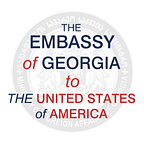Ambassador Bakradze testify before Senate
Ambassador of Georgia David Bakradze testified on ‘Russian Policies and Intentions Toward Specific European Countries’ before Senate Committee on Appropriations, Subcommittee on State, Foreign Operations, and Related Programs on March 7th, together with the Ambassadors to Washington from Poland, Latvia, Lithuania, Estonia, and the Minister of Foreign Affairs of Ukraine.
Ambassador David Bakradze:
Mr. Chairman, ladies and gentlemen, I am here today to remind you that before Ukraine, Georgia was invaded in 2008 and 20% of our country remains under Russian occupation. Despite ongoing Russian aggression, with the support of the United States, Georgia has made tremendous strides in strengthening democratic institutions, fostering economic development and solidifying an irreversible path towards European and Euro-Atlantic integration. I am also here to tell you that we need a stronger America for Georgia and the region.
The conflict, which started in the early 90s reached its peak in 2008 with the Russian invasion of Georgia and occupation of our territories, as the international community failed to effectively respond to early warning signs.
Russia continues its occupation with up to 10,000 Russian military, security and FSB border guard personnel. The Russian occupation forces have no legal mandate and are in stark violation of international law and the August 12, 2008 Ceasefire Agreement.
In 2009, Russia began installing razor wire fences and other artificial obstacles along the occupation line. The total length of the trenches across both occupation lines is more than 62 miles. We greatly appreciate the interest of Congress and frequent visits of members of both bodies to the occupation line.
In further violation of the Ceasefire Agreement, Moscow has signed so-called “treaties” with the occupation regimes. These documents represent a step towards annexation of Georgia’s occupied regions, as they provide foundation for the full integration into social, economic, administrative and — most importantly — military and security institutions of the Russian Federation.
Georgia is pursuing an engagement and reconciliation process with the people in the occupied territories. We make all the benefits, available for Georgian citizens, also accessible for our compatriots residing on the other side of occupation line: free healthcare, educational, cultural, and scientific programs, other benefits of Georgia’s European path — such as Visa liberalization.
Since regaining its independence, to undermine Georgian sovereignty and territorial integrity, Georgia has been subject to different forms of unconventional, hybrid warfare. Russian propaganda in Georgia (in addition to economic embargo of 2006, energy cuts, cyber-attacks in 2008) seeks to challenge and derail Georgia’s European and Euro-Atlantic integration aspirations. It builds on fears that exist in different societies, creating myths and communicating through different forms of media. A recent example is the spreading of false information that the well-deserved Visa free travel decision for Georgian citizens to Europe came at the expense of building refugee camps in Georgia.
The Georgian Government has been effective in its strategic communications efforts, through a coordinated approach dismantling myths; but also countering anti-western narrative on futility of reform agenda associated with Euro-Atlantic integration by bringing tangible results of this path, like the DCFTA, AA and Visa Liberalization. As a result, we have maintained strong support for Georgia’s EU and NATO aspirations within 70–75%.
Overall, despite Russia’s vicious efforts, Georgia has persisted on its path toward democratic progress and economic growth. For a small nation, Georgia makes an outsized contribution to international security efforts, allocating more than 2% of our GDP to defense spending. We are a committed partner in the fight against terrorism and the largest per capita contributor to NATO’s Resolute Support mission in Afghanistan with one of the highest number of 870 servicemen. Georgian soldiers proudly stand shoulder-to-shoulder with allies in the most dangerous parts of the world.
In recent years, we have made great progress in building strong and effective state institutions, ensuring: democracy, human rights, and the rule of law. Because we believe that our political and economic progress will ultimately serve as potent antidotes to Russia’s expansionist designs.
For the last decade, Georgia, as the most reliable, democratic ally of the US in a tough region, has been a great example of American tax-payers’ money wisely spent. Let me use this opportunity to invite Sub- Committee members and staff to visit Georgia and see firsthand the transformational power of US assistance.
Last year, we signed a memorandum on deepening the security and defense partnership between our two nations, and we successfully launched the Georgia Defense Readiness Program. Further improvement of these programs and elevation of our security partnership is of vital importance, as we believe Georgia remains an essential piece of the Euro-Atlantic security architecture.
When the Cold War ended, and the Soviet Union dissolved, the US and its allies sought to build Europe whole, free, and at peace. Today, when one of the basic foundations of security and peace — respect for national borders — is violated, new transatlantic leadership is needed to fortify and enlarge the alliance.
We believe a comprehensive long-term engagement strategy of the new administration will include the strengthening of Georgia’s territorial integrity and sovereignty, improving bilateral trade, economic and investment relationship, and supporting the democratic choice of the Georgian people to integrate with Euro-Atlantic institutions. All these measures will make Georgia stronger and more resilient. That is important because A STRONGER GEORGIA IS IN AMERICA’S INTEREST AS MUCH AS A STRONGER AMERICA IS IN GEORGIA’S INTEREST.
